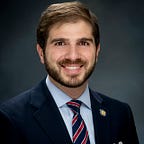On police accountability, racial justice, and 50-a
It’s one thing to say you believe in equality and justice for all, and it’s another thing to critically examine how your actions advance those beliefs. As a legislator, there is an added imperative that every vote I take must live up to the ideas I profess to believe and support.
George Floyd was murdered by ex-police officer Derek Chauvin on May 25, 2020 when he held his knee on Floyd’s neck for 8 minutes and 46 seconds.
Set a timer on your phone and try to sit quietly for that length of time. It’s a frighteningly long silence.
George Floyd’s murderer and his accomplices were arrested and will hopefully be brought to justice. As they should be.
But that is the exception, not the rule. The uncomfortable truth of the matter is that many times, when Black people like Breonna Taylor, or Eric Garner, or Tamir Rice, are killed by police officers — or in the case of Ahmaud Arbery, by gun-toting vigilantes — there is no justice. There is no accountability. There is no reckoning with the pain caused by a life so cruelly taken. The lives of Black Americans are treated as if they don’t matter in our justice system.
This is not new. This has been going on for decades. And unless we finally wake up and do something different — something meaningful — it will continue to happen again and again and again. Black lives matter. We must act.
Here’s what I know to be true:
(1) police officers, like all public servants, must be held accountable for their actions but state law prevents their disciplinary records from ever becoming public; and
(2) it is entirely legitimate to have deep abiding respect for police officers who put their lives on the line to protect our neighborhoods while simultaneously holding them accountable for their actions while they serve.
I have great respect for the men and women who wear uniforms and pledge to keep our city safe. One of my oldest childhood friends is a police officer. My cousin is a police officer. My godfather is a retired captain. I work everyday with our local precinct officers to help keep our community’s quality of life. There’s not a day that goes by that I don’t worry about whether I’ll get a phone call from my friend’s or my cousin’s wife, or the local captain, that something went terribly wrong and someone was injured or killed. Yet we live in a country where the reality is that a terrible fear that a loved one will be victim of violence is one that Black mothers and fathers must grapple with every time their child leaves the house.
Over the last few days, I have received thousands of phone calls, emails, and messages asking me to change the law, section 50-a of the Civil Rights Law, that keeps records of abusive and excessive police misconduct hidden from public view. I agree. We must also protect the personal information that exists in personnel records such as home addresses, personal phone numbers, and spousal information because we can’t put their families in harm’s way.
When I go back to Albany, that’s what I’ll vote to do.
Allowing these disciplinary records to remain hidden perpetuates a culture where those who break the rules and the public’s trust will never face consequences. If an officer violates their oath to protect and serve, it is in the interests of no one — least of all fellow law enforcement — to allow them to continue on the job without consequence. A 2014 WNYC analysis of CCRB records showed that the vast majority of officers had zero or one complaints against them, but a small percentage of officers, roughly 3%, had 10 or more complaints. To fail to hold such officers accountable devalues the work of each and every honest law enforcement officer and puts Black peoples’ lives in danger.
Derek Chauvin, who so casually snuffed out George Floyd’s life in broad daylight, had 18 prior complaints.
I know that some of you reading this will say that voting for accountability is an attack on the police. That couldn’t be further from the truth. True respect for the police means that we thank them when they do good, and hold them accountable when they don’t.
The truth is, this is just scratching the surface. We have so much more to do to break down the systemic racism that has been built up over centuries and has seeped into every aspect of our society. But this is a tangible step forward that begins to meet the moment we are in.
New York is ready for change. This is a start.
